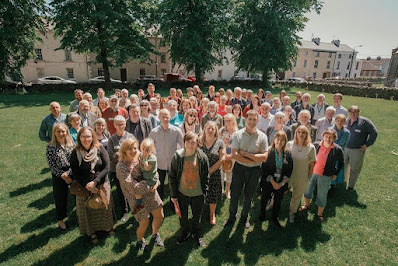My words at the Green Party pre-election convention at the RDS, 20th April 2024
I want to talk about climate, I want to talk about justice, and I want to talk about democracy.
We know what we want to achieve on all three of these, but these are challenging times, and there are stormy waters ahead. Five years ago, the wind was behind us. Today, our actions demand competent leadership and well-trained crew for the strong winds and rough seas lie ahead.
The good news on climate is that in Europe we’ve agreed the Fit for 55 Package, we’re on course to reduce emissions in the years ahead. The European Green Deal survived Brexit, Covid and war in Ukraine and the Middle East. It would not have happened without the Greens in Europe, and the Greens in Government here, and in other countries.
The bad news is that we need to do much more in the years ahead, and we don’t have the critical mass of political support to achieve this. We need at least a 90% reduction in greenhouse gas emissions in Europe over the next fifteen years. We cannot slow down or stall our climate action. The far-right are in denial, and the centre right are unwilling to pick up the tab. Not only that, but the centre also-right produced a kill list of climate laws that they did not want to see passed in the European parliament. This cannot be allowed to happen. There is the danger that the window of opportunity in the 2020s will be lost, and that we will repeat the mistake of fiscal austerity from the financial crisis fifteen years ago. The danger now is that it will be a social and environmental crisis, exposing the least-well off to high energy costs, and weather extremes due to climate change in future years. The time to invest is now, and we must not cripple ourselves with fiscal rules into a failure to act.
Justice is at the heart of climate action. We cannot pass the burden of climate action onto the next generation. We must act now to protect our young people. Just yesterday outside Dáil Éireann I met with young climate activists. They are angry that we are not doing enough to help them. It is no wonder that they are turning to the courts to seek justice. Our climate plans must be fairer and faster if we are to avoid a polarised and prolonged battle in the courts. Of course, the European Court of Human Rights should not decide what we do on climate, but if governments fail to act with the speed and depth of response that is needed then I support them.
Democracy is a core value of the Irish people and the European Union. However, we must ensure that it is delivered at the most effective level. When I cycle down Parliament Street in Dublin I see three flags on top of our City Hall. One is Dublin, one is Ireland, and one is that of the European Union. Democracy must be delivered in all three. Ireland is an outlier when it comes to local democracy. It is outrageous that the plebiscite on whether Dublin should have a directly elected mayor has been postponed from being held on 7th June. If we believe in democracy, we should give local government in Ireland the powers and the leadership it deserves, that are the norm elsewhere in Europe. They should be the norms in Ireland too.
Democracy will be empowered by the green transition. Each additional year of dependency on fossil fuels is strengthening the hands of the oligarchs and dictators who supply us with our oil and gas. Every time we erect a wind turbine, or install a heat pump we reduce the power that these people wield. Throughout my work on the Greening Buildings law in Brussels I have said if we insulate homes we isolate Putin. This has never truer than today.
Democracy is under threat at a deeper level in Hungary, in Slovakia and elsewhere in Europe. We must protect democratic values, and we must defend those who are under attack, in Ukraine and in Gaza. We must provide humanitarian aid to Ukraine, and we must come to the aid of humanity in Palestine.
I will work for a safer world where developing countries receive the support they need, and migrants no longer drown in the Mediterranean. I will continue to insist on support for Gaza and Ukraine. I will ensure your voice is heard in Brussels. That is my promise to you, and to the people of Dublin for the next five years.









